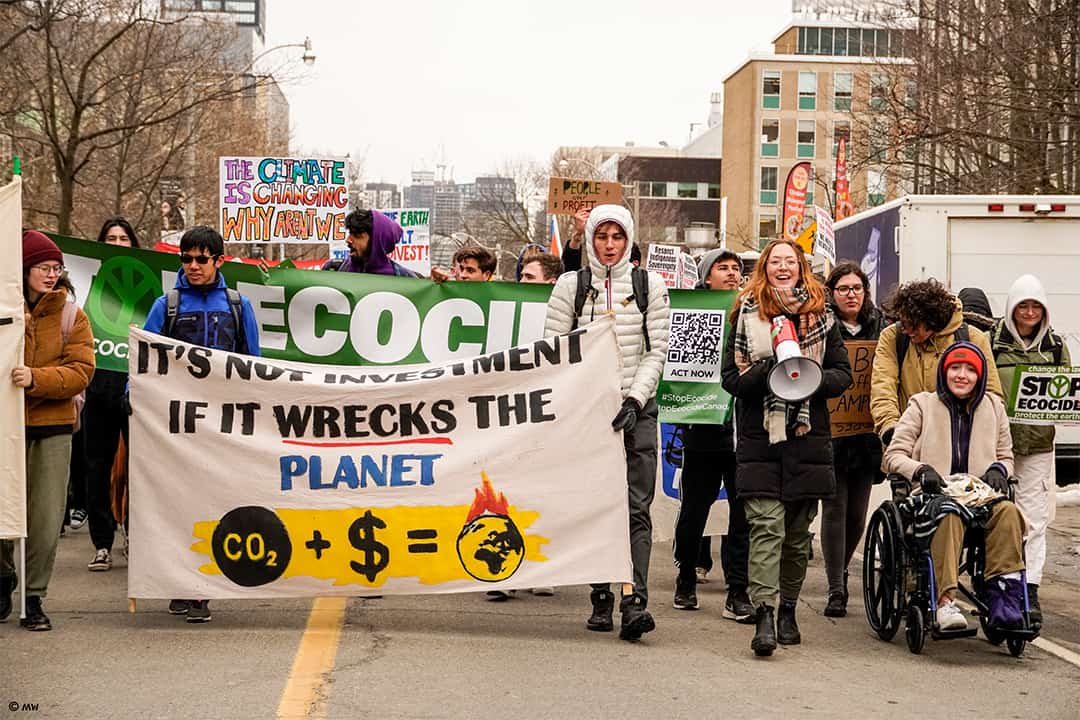On February 14, Climate Justice UofT (CJ UofT) launched a campaign to push the University Pension Plan (UPP) to stop investing staff and faculty retirement savings in fossil fuels. Concerned faculty and staff have been advocating for divestment since the inception of the UPP, and we, the writers, stand in solidarity with this student UPP divestment campaign. Students should care about this issue because it’s their tuition fees that partially fund the UPP. Students should not be bankrolling the destruction of their own futures, and it is abhorrent to us that our compensation packages are complicit in the continued financing of oil and gas.
When many U of T faculty and staff voted in 2019 to transition from the old U of T pension plan into the new one, jointly sponsored UPP with Queen’s University and the University of Guelph, many of us did so with the understanding that the UPP would allow us to have a say in how our money is invested. We hoped the UPP would be more sustainable — both in terms of financial security in retirement and how our money was being used to exacerbate the climate crisis.
The University of Guelph divested its endowment from fossil fuel companies in 2020, followed by U of T in 2021 and all of its federated colleges by 2023. Many large institutions across the world have done the same, not simply because there is a moral imperative to do so but because evidence shows that fossil-free portfolios outperform those that continue to hold positions in oil and gas. A University of Waterloo study found US pension plans would be $21 billion richer if they had divested a decade ago. So why is the UPP dragging its feet?
We see the UPP as relatively more progressive than other Canadian pension plans, having released a Climate Stewardship Plan, a Climate Transition Investment Framework, and an updated Proxy Voting Policy clarifying their “expectations for company directors on climate action” and “support for Indigenous rights and reconciliation.” We applaud the plan’s managers for these efforts and for its decision to focus on counteracting the fossil fuel finance provided by banks as part of its broader engagement strategy, to motivate companies it remains invested in to become better climate actors. But we demand better, faster.
To begin with, we call on the UPP to provide full transparency and progress reports with respect to the 27 companies it identified to focus on in its engagement strategy — in recent meetings with plan members, UPP management has explicitly refused to name these companies.
The Climate Stewardship Plan lacks details on what the UPP will do when, as we predict, its so-called engagement efforts inevitably fail to result in credible plans that align with the UPP’s net zero commitment. And we know they will fail because there is no pathway for oil and gas companies to reach net zero emissions without entirely phasing out production of fossil fuels. This is why major academic institutions like the University of California and giant public investors like PFZW — the Netherlands’ second-largest pension fund, with 349.86 billion dollars under management — have decided to replace fossil industry engagement with divestment.
One of the ways that fossil fuel advocates push back against divestment is by promoting distract and delay technologies like carbon capture. But these initiatives are incredibly expensive and do nothing to stop the industry’s scope three emissions — the carbon dioxide released when oil and gas are eventually burned in your car’s gas tank or your home’s furnace. These emissions make up about 85 per cent of lifecycle oil and gas emissions. Even negotiators at COP28 — the United Nations Climate Change Conference — managed to agree in December 2023 that transitioning away from fossil fuels is essential if we are to have any hope of eventually achieving the Paris Agreement goal of limiting global warming to 1.5 degrees Celsius.
In its Climate Transition Investment Framework and updated Proxy Voting Policy, the UPP lumps oil and gas together with other “high emitting sectors” and fails to acknowledge the need to phase out fossil fuel investments entirely. In fact, the framework reads like a confusing and complicated justification to continue investing in fossil fuels.
Humanity and the stable climate we depend on don’t have time for this. While the UPP does at least have a coal exclusion policy, there is growing scientific evidence that gas is just as emissions-intensive as coal. Further, new research published in Science has found that harmful emissions from Canada’s oil sands are up to 64 times higher than what’s been previously reported by the industry.
We, as members of the Faculty Association and the United Steelworkers at U of T, are calling for the UPP to divest from oil and gas. Students, faculty, and staff at Queen’s, Guelph, and Trent are also reaching out to members of the Sponsor Board and the Board of Trustees at the UPP, demanding divestment now. There is scientific consensus that a safe climate future requires a rapid phase-out of fossil fuels.
Now is the time for our pension fund to stop investing in the industry that threatens our collective future. There can be no more excuses.
If you agree, join us by signing CJ UofT’s Open Letter: Divest the UPP.
Kristy Bard is a member of the United Steelworkers Local 1998 member and Project Manager of U of T’s Committee on the Environment, Climate Change, and Sustainability.
Paul Downes is a professor in the Department of English at UTSG. He is also a member of the Academic Board and of the University of Toronto Faculty Association Pension Committee.



No comments to display.